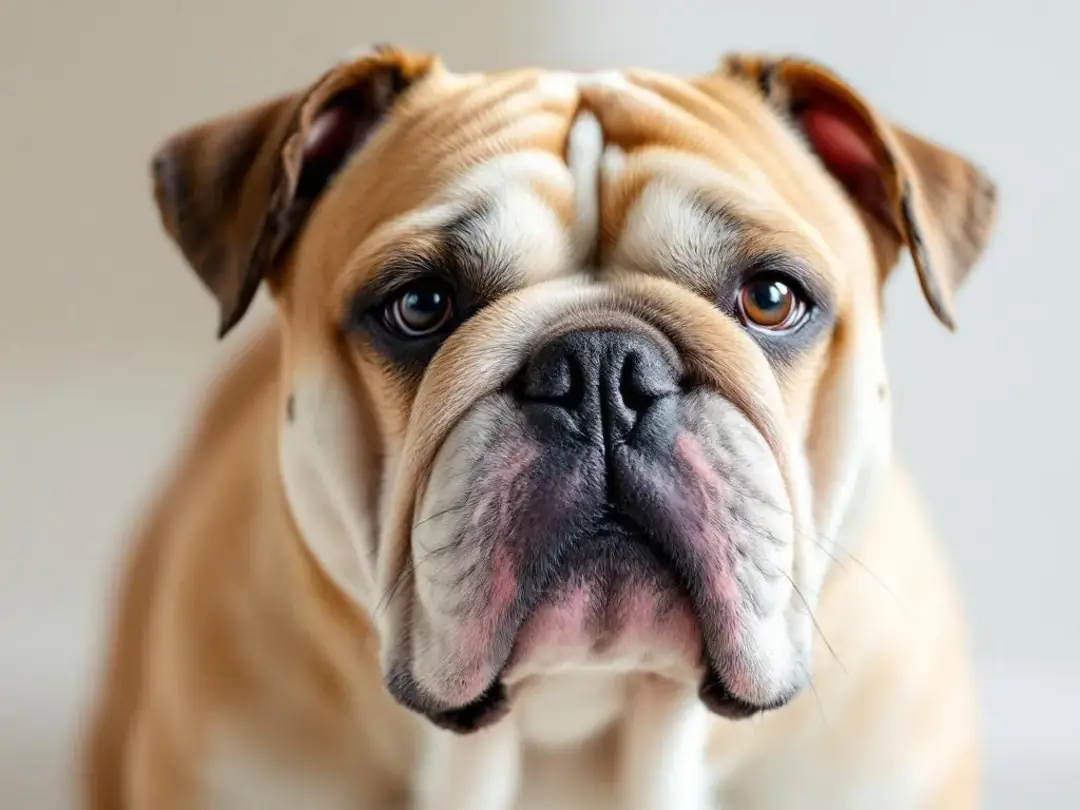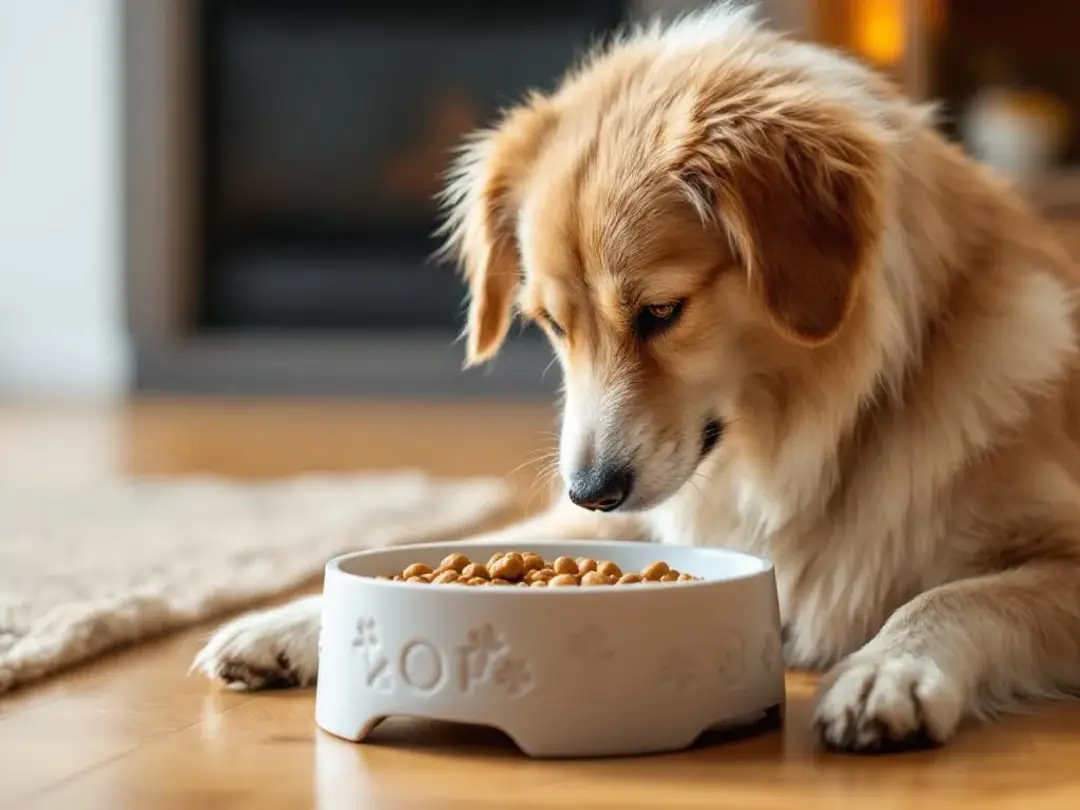Key Takeaways
-
Dog hiccups are caused by involuntary diaphragm muscle spasms and are usually harmless
-
Puppies experience hiccups more frequently than adult dogs due to immature digestive and respiratory systems
-
Common triggers include eating too fast, excitement, temperature changes, and swallowing air
-
Most dog's hiccups resolve naturally within minutes, but persistent episodes lasting over an hour may be a symptom of an underlying health issue and require veterinary attention
-
Simple remedies like slow feeding, gentle belly rubs, and calm water drinking can help stop hiccups
What Are Dog Hiccups?
Dog hiccups occur when the diaphragm-the crucial muscle separating the chest cavity from the stomach-contracts involuntarily. The diaphragm plays a crucial role in the breathing process, helping to move air in and out of the lungs. These diaphragm spasms create a sudden intake of air that causes the vocal cords to close abruptly, producing that characteristic "hic" sound we recognize.
The mechanism behind dog hiccups mirrors human hiccups almost exactly. When the diaphragm contracts unexpectedly, it disrupts your dog's normal breathing pattern, creating those rhythmic, jerky movements you'll notice in their chest and abdomen. The muscle spasms affect the lungs and the dog's breath, leading to the hiccup response. The muscle spasms happen rapidly and repeatedly, which is why hiccups occur in that familiar rhythmic pattern.
You'll typically see your dog's chest and belly area flutter or jerk slightly with each hiccup. Unlike other breathing issues, hiccups produce distinct sounds and a regular pattern that's usually easy to identify. The spasm affects the breathing muscles in a way that's temporary and generally harmless.
What makes this particularly interesting is that hiccups appear to be a trait shared across mammalian species. Just as humans experience these involuntary muscle contractions, dogs and other mammals have this same reflex built into their respiratory system.
Recognizing Hiccups in Dogs
Recognizing hiccups in dogs is an important skill for any pet parent. When dog hiccups occur, you'll typically notice a sudden, repetitive "hic" sound-caused by the diaphragm contracting involuntarily and the vocal cords closing abruptly. This is often accompanied by a gentle, jerky movement in your dog's chest cavity as the muscle spasms. In most cases, these hiccups in dogs are perfectly normal and not a sign of an underlying health issue.
The sound and movement are usually easy to spot: your dog may pause briefly, their chest or belly might twitch, and you'll hear that familiar hiccup sound. Most dogs act completely normal during these episodes, showing no signs of pain or distress. However, it's always wise to pay attention to the frequency and duration of the hiccups. If you notice any unusual symptoms or if the hiccups seem to occur more often than usual, it could be a sign to monitor your dog more closely. In general, though, hiccups are a harmless reflex that occurs when the diaphragm contracts and the vocal cords close abruptly-just another quirky part of being a dog!


Why Puppies Get Hiccups More Often
If you've noticed that your puppy seems to get hiccups far more often than adult dogs, you're absolutely right. Puppies under six months old experience hiccups much more frequently due to their developing respiratory and digestive systems.
Young puppies have weaker diaphragm control, making the muscle more susceptible to those involuntary contractions. In addition, a puppy's irregular breathing and developing dog's breathing pattern make them more susceptible to hiccups. Their breathing muscles are still maturing, and their nervous system hasn't fully developed the smooth coordination that adult dogs possess. This immaturity means that even small triggers can cause diaphragm spasms.
Remarkably, puppy hiccups can occur even during sleep or while nursing. Some puppies may hiccup multiple times throughout the day, and this is typically considered perfectly normal behavior. The frequency usually decreases significantly as they grow and their systems mature.
Hiccups may even occur in utero as part of normal fetal development, similar to what happens with human babies. This suggests that hiccupping serves some developmental purpose, possibly helping to strengthen the diaphragm and prepare the respiratory system for life outside the womb.
For most pup owners, daily occasional hiccups in young dogs are nothing to worry about. As your puppy grows into an adult dog, you'll likely notice these episodes become much less frequent and eventually quite rare.


Common Causes of Dog Hiccups
Understanding what can trigger hiccups helps you both prevent them and stay calm when they occur. Most dog hiccup episodes stem from everyday activities and behaviors that temporarily irritate the diaphragm.
Eating or Drinking Too Fast The most common trigger happens when dogs gulp their food or drink water too quickly. Rapid eating causes dogs to swallow air along with their meals, which can distend the stomach and put pressure on the diaphragm. This swallowing air creates the perfect conditions for those muscle spasms to begin.
Excitement and Overstimulation Overexcitement stress during playtime, greetings, or new experiences can alter your dog's breathing pattern dramatically. When dogs pant heavily or breathe rapidly due to excitement, it can trigger hiccups. You might notice this after vigorous play sessions or when guests arrive at your home.
Temperature Changes Sudden exposure to different temperatures-whether drinking cold water on a hot day or moving from a warm house to cold outdoor air-can stimulate the diaphragm nerves and trigger hiccups. Even consuming certain foods at extreme temperatures can have this effect.
Stress and Heavy Panting Anxiety, stress, or any situation that causes labored breathing can lead to hiccups. Dogs who are nervous about vet visits, car rides, or other stressful situations may experience irregular or difficult breathing that results in diaphragm spasms.
Overeating and Large Meals Consuming large portions can put physical pressure on the diaphragm as the stomach expands. This is particularly common when dogs haven't eaten for a while and then consume their entire meal quickly.
Breed-Specific Susceptibility
Brachycephalic breeds-those adorable flat-faced dogs like bulldogs, pugs, and Boston terriers-face higher hiccup risk due to their unique anatomy. Their shortened airways and compressed breathing passages make them more prone to respiratory issues that can trigger hiccups.
These breeds often experience breathing difficulties under normal circumstances, which predisposes them to diaphragm irritation. Their anatomy means that even minor triggers can result in more frequent or severe hiccup episodes compared to other dogs.
The structural differences in their respiratory system mean that activities like drinking water, eating, or even mild excitement can more easily disrupt their breathing pattern and lead to hiccups.
How Long Do Dog Hiccups Last?
The good news for most pet parents is that occasional hiccups in dogs are short-lived. In most cases, a bout of hiccups will last just a few minutes-typically no more than 10 to 15 minutes-before resolving on its own. These brief episodes are considered normal and usually don't require any intervention.
However, if you notice persistent hiccups that last for more than an hour, or if your dog experiences chronic hiccups that occur frequently throughout the day, it may be time to seek veterinary advice. Persistent or chronic hiccups can sometimes signal an underlying issue, such as an upset stomach, respiratory problems, or other health issues. If you're concerned about how to get rid of dog hiccups that won't go away, a vet visit is the best way to rule out any serious problems and get guidance on next steps. Remember, while most cases of hiccups in dogs are harmless, it's always better to err on the side of caution if you notice anything unusual.
How to Stop Dog Hiccups
Most dog hiccup episodes resolve naturally within five to ten minutes without any intervention. However, if you want to help your dog feel more comfortable, there are several gentle techniques you can try.
Gentle Belly Massage A soft tummy rub can help calm irregular breathing and relax the diaphragm. Use slow, circular motions on your dog's chest and belly area. This gentle pressure can help reset the muscle and encourage normal breathing patterns. Keep your dog calm during this process-speak softly and move slowly.
Encourage Slow Water Drinking Offering small amounts of fresh drinking water can help. The act of swallowing can sometimes interrupt the hiccup cycle and help the diaphragm return to normal function. Make sure your dog drinks slowly rather than gulping, as rapid drinking could actually make hiccups worse.
Light Exercise or Distraction Sometimes a gentle distraction can help break the hiccup pattern. Try a slow walk around the house or engage your dog in a calm activity. The goal is to normalize their breathing without causing excitement that might trigger more spasms.
Remove Food and Water Bowls If your dog is actively eating or drinking when hiccups start, temporarily remove their bowls. This prevents them from continuing to swallow air, which could prolong the episode.
Important: Avoid Human Remedies Never try to scare your dog or use any of the "shock" methods sometimes used for human hiccups. Don't attempt to pull their tongue or use any forceful techniques. These approaches can stress your dog and potentially make the situation worse.


Prevention Strategies
Preventing hiccups often comes down to managing your dog's eating habits and environment. Simple changes can significantly reduce how often your dog experiences these episodes.
Slow Feeder Bowls and Puzzle Feeders Invest in slow feeder bowls designed with ridges or obstacles that force dogs to eat more slowly. Puzzle feeders work similarly by making your dog work for their food, naturally slowing down their eating pace and reducing air swallowing.
Smaller, More Frequent Meals Instead of one or two large meals, try feeding smaller portions three to four times daily. This prevents overeating and reduces the stomach pressure that can trigger hiccups. Smaller meals are easier to digest and less likely to cause the stomach distension that irritates the diaphragm.
Calm Mealtime Environment Create a peaceful feeding environment by feeding your dog away from other pets or distractions. Competition for food often leads to rapid eating and subsequent swallowing air. Some dogs benefit from being fed in a quiet, separate area where they can eat at their own pace.
Temperature Management Avoid giving your dog extremely cold or hot food and water. Room temperature options are less likely to shock the system and trigger hiccups. During hot weather, let cold water warm up slightly before offering it to your dog.
Gradual Diet Changes When switching foods, do so gradually over five to seven days. Sudden dietary changes can cause upset stomach and digestive issues that may lead to hiccups. Monitor how your dog responds to certain foods and avoid those that seem to trigger episodes.
When Dog Hiccups Become Concerning
While the vast majority of hiccup episodes are harmless, certain signs indicate it's time to seek veterinary advice. Recognizing these red flags can help you distinguish between normal hiccups and potential underlying health issues.
Duration Concerns Any hiccup episode lasting longer than 60 minutes warrants attention. Normal hiccups should resolve within minutes, so persistent hiccups suggest something more than a simple diaphragm spasm might be occurring.
Accompanying Symptoms Watch for other symptoms occurring alongside the hiccups:
-
Difficulty breathing or wheezing sound
-
Vomiting or excessive drooling
-
Signs of distress like pacing or inability to settle
-
Loss of appetite or lethargy
-
Coughing that doesn't resolve
-
Behavioral changes like hiding or aggression
Frequency Patterns If your adult dog suddenly starts experiencing multiple hiccup episodes daily for several days in a row, this change in pattern could indicate an underlying issue that needs investigation.
Serious Medical Conditions
While rare, chronic hiccups can sometimes signal more serious health problems that require veterinary attention.
Respiratory Issues Conditions like asthma, pneumonia, or bronchitis can cause breathing irregularities that manifest as persistent hiccups. These respiratory issues affect the normal function of breathing muscles and can create ongoing diaphragm irritation.
Gastrointestinal Problems Digestive disorders including intestinal blockages, acid reflux, or inflammatory bowel disease can cause chronic hiccups. An upset stomach or ongoing digestive issues can create pressure and irritation that affects the diaphragm's normal function.
Heart Disease Certain heart conditions can put pressure on the diaphragm or affect the nerves that control it. Persistent hiccups in older dogs might sometimes be related to cardiac issues that require medical evaluation.
Parasitic Infections Internal parasites can cause digestive upset and inflammation that leads to recurring hiccups. Regular parasite prevention helps avoid these issues, but established infections may require treatment.
Neurological Causes Though extremely rare, tumors or neurological conditions affecting the nerves that control the diaphragm can cause chronic hiccups. These cases typically involve other neurological symptoms as well.
When to Contact Your Veterinarian
Knowing when to schedule a vet visit versus when to monitor at home can save both stress and unnecessary expense while ensuring your dog gets help when needed.
Immediate Veterinary Attention Contact your veterinarian immediately if hiccups are accompanied by:
-
Severe difficulty breathing or labored breathing
-
Signs of pain or extreme distress
-
Vomiting that doesn't stop
-
Collapse or loss of consciousness
-
Blue-tinged gums or tongue
Schedule an Appointment If:
-
Hiccups persist for more than one hour
-
Episodes occur daily for more than a week
-
Your dog shows other symptoms like decreased appetite, lethargy, or behavioral changes
-
The frequency or intensity of hiccups suddenly increases in an adult dog
Keep a Hiccup Diary If hiccups become frequent, track when they occur, how long they last, and what your dog was doing beforehand. This information helps your veterinarian identify patterns and potential triggers.
Questions for Your Vet Visit Prepare to discuss:
-
When the hiccups started and how often they occur
-
Any changes in diet, environment, or routine
-
Other symptoms you've noticed
-
Your dog's overall health and energy levels
Your veterinarian may recommend diagnostic tests like X-rays or blood work if they suspect an underlying condition. Most hiccup investigations start with a thorough physical examination and medical history.
FAQ
Can dog hiccups be a sign of worms or parasites?
Yes, intestinal parasites can sometimes cause digestive upset that leads to hiccups, though this isn't the most common presentation. Parasites typically cause other symptoms like changes in appetite, stool quality, or weight loss alongside any hiccup episodes. Regular parasite prevention and annual fecal examinations help catch these issues early.
Do certain dog foods cause more hiccups than others?
Spicy foods, though rarely fed to dogs, can trigger hiccups due to their irritating effects on the digestive system. More commonly, foods that are difficult to digest, very rich, or fed in large quantities can contribute to hiccups. Dry kibble eaten too quickly is often more problematic than wet food because dogs tend to gulp dry food and swallow more air in the process.
Is it normal for senior dogs to suddenly start getting frequent hiccups?
New onset of frequent hiccups in older dogs should be evaluated by a veterinarian, as it could indicate underlying health issues like heart disease, respiratory problems, or gastrointestinal disorders. While occasional hiccups can be normal at any age, a sudden increase in frequency warrants investigation, especially in senior pets.
Can medications cause hiccups in dogs?
Certain medications, particularly those affecting the nervous system or causing nausea, can potentially trigger hiccups as a side effect. If you notice hiccups starting after beginning a new medication, discuss this with your veterinarian. They may be able to adjust dosing, timing, or switch to an alternative medication if needed.
Should I wake my dog up if they're hiccuping while sleeping?
Generally, no. Hiccups during sleep are particularly common in puppies and usually resolve on their own without disturbing the dog's rest. Waking a sleeping dog unnecessarily can cause stress and disrupt important sleep cycles. Only wake your dog if the hiccups seem severe, prolonged, or are accompanied by signs of distress like whimpering or difficulty breathing.
Conclusion
In conclusion, hiccups in dogs are a common and usually harmless occurrence, often triggered by eating or drinking too quickly, spicy foods, overexcitement, or stress. While most episodes are nothing to worry about, it's important to keep an eye on your dog's symptoms and watch for signs like difficulty breathing, labored breathing, or vomiting. To help prevent hiccups, consider using slow feeder bowls, offering smaller portions, and encouraging your dog to drink water slowly-especially after eating or drinking.
If you ever feel unsure about your dog's hiccups, or if they're accompanied by other symptoms such as wheezing, irregular breathing, or persistent discomfort, don't hesitate to seek veterinary advice. By understanding what causes hiccups in dogs and knowing how to get rid of them when needed, you can help your furry friend breathe easier and stay healthy. Remember, a little attention to your dog's eating, drinking, and feeding habits can go a long way in preventing hiccups and keeping your pup happy and stress-free.






